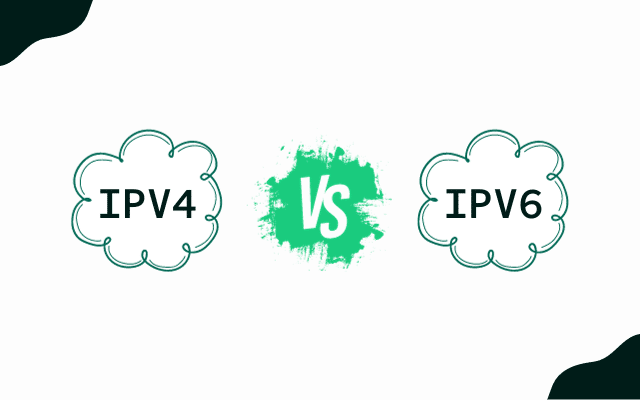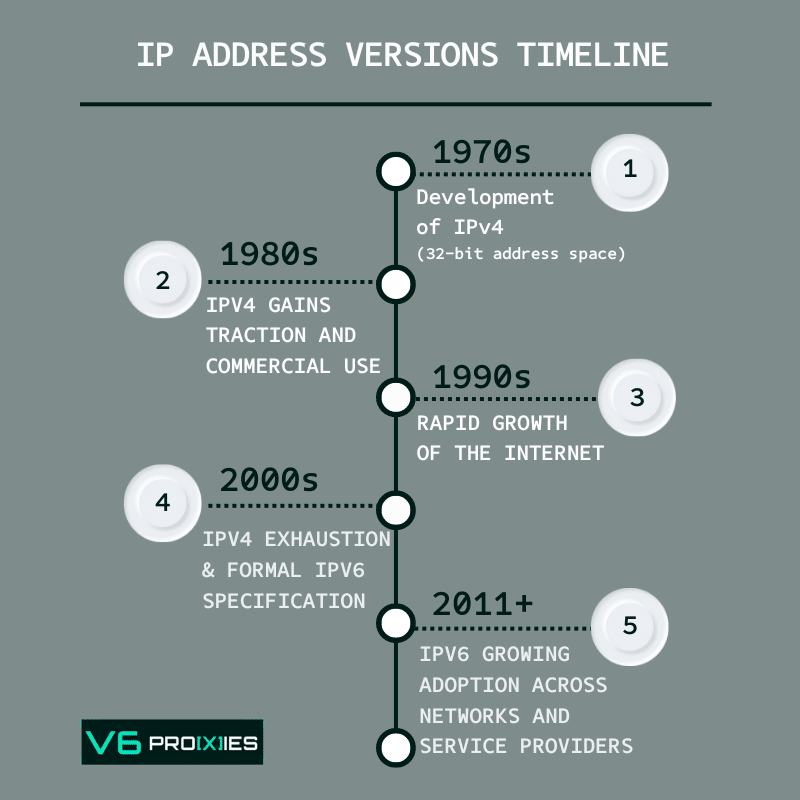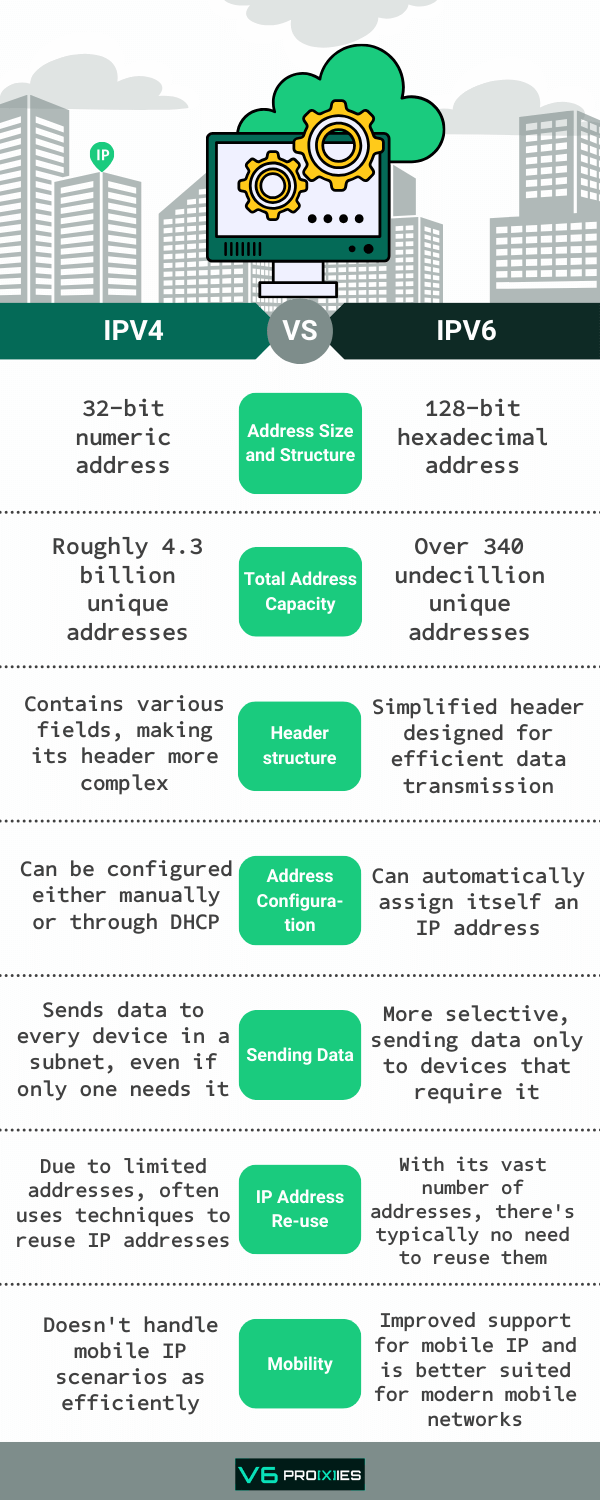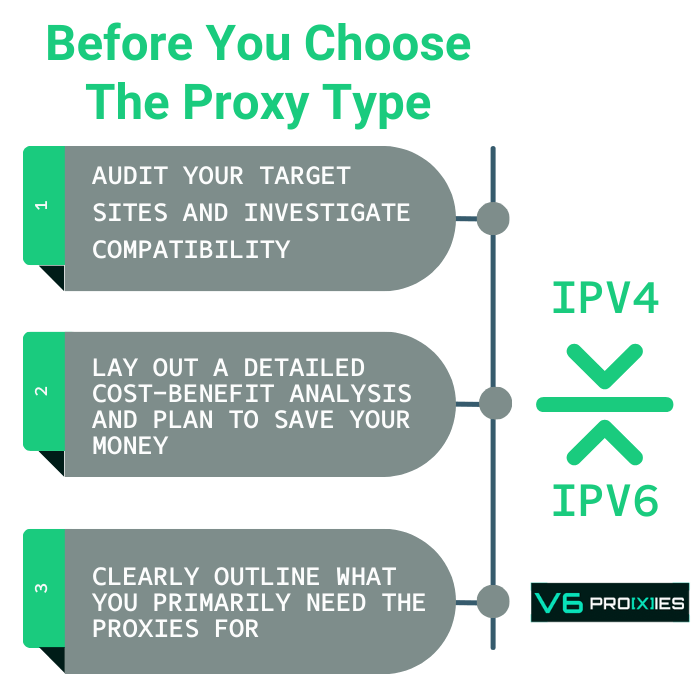The debate of IPv4 vs IPv6 often feels like a heavyweight championship match. Both have their use cases, advantages and limitations. The key question is which suits your needs best? To answer this, this article will dive into the stark differences between IPv4 and IPv6, evaluating their pros and cons, discussing use cases and comparing their security features.
The goal is not to bother you with mere theories, but to help you make an informed choice. We will answer your main questions about:
- The Core differences between IPv4 and IPv6
- Pros and cons of IPv4 vs. IPv6
- Compare security in IPv6 and IPv4
- Discuss which one is better in different business use cases
Understanding the differences and applications between IPv4 and IPv6 proxies can have significant implications on the performance, costs, security, and privacy of your business operations.
Table of Contents
The Shift to IPV6
Think of it as a city running out of land to build new houses.
The transition to IPv6 is not just a random shift; it’s a response to the evolving digital landscape. With the explosive growth of devices and the internet’s expansion, the address space of IPv4 started depleting rapidly.
IPv6, offering a nearly limitless address pool, is like unlocking a whole new continent for settlement. This shift doesn’t just offer more addresses; it brings with it enhanced security protocols and efficient routing.
But as with any migration, it comes with its set of challenges and benefits. As we discuss the nuances of IPv4 vs. IPv6, you’ll gain a clearer picture of where each stands in this technological evolution.
More to read: What is an IP adddress?
The Main Differences Between IPV4 and IPv6
At their core, IPv4 and IPv6 are like two generations of a technology dynasty. IPv4, the elder, uses a 32-bit numeric system, allowing it to create roughly 4.3 billion unique addresses. Meanwhile, IPv6, the modern heir, ups the game with a 128-bit hexadecimal method, capable of producing an astronomical number of unique addresses, over 340 undecillion to be precise.
This is more than enough to address every device on Earth for many years to come.
Beyond sheer numbers, the main differences between the two is as follows:
Address Size and Structure
- IPv4: 32-bit numeric address.
- IPv6: 128-bit hexadecimal address.
Total Address Capacity
- IPv4: Roughly 4.3 billion unique addresses.
- IPv6: Over 340 undecillion unique addresses. That’s 340 followed by 36 zeros!
Header Complexity
- IPv4: Contains various fields, making its header more complex.
- IPv6: Simplified header designed for efficient data transmission.
Address Configuration
- IPv4: Can be configured either manually or through DHCP.
- IPv6: Can automatically assign itself an IP address.
Sending Data
- IPv4: Sends data to every device in a subnet, even if only one needs it.
- IPv6: More selective, sending data only to devices that require it.
IP Address Management and Re-use
- IPv4: Due to limited addresses, often uses techniques to reuse IP addresses.
- IPv6: With its vast number of addresses, there’s typically no need to reuse them.
Mobility
- IPv4: Doesn’t handle mobile IP scenarios as efficiently.
- IPv6: Improved support for mobile IP and is better suited for modern mobile networks.
Considering the Cost Factor
The choice between IPv6 and IPv4 isn’t solely based on technical specifications. The cost implications, especially for businesses, play a pivotal role in driving decisions. Let’s break down the cost dynamics of both proxy types to help businesses gauge which offers better value.
IPv6 Proxies Costs
Initial Setup Costs
Deploying IPv6 might involve updating or replacing some existing infrastructure components to be IPv6 compatible.
While this might mean an upfront cost, businesses need to see this as an investment for future-proofing their operations.
Address Abundance = Lower Costs
Given the vast address space of IPv6, the cost per IP is generally lower than IPv4. This makes bulk acquisitions for large-scale operations more cost-effective.
Maintenance & Management
As a modern architecture, IPv6 might offer cost savings in terms of long-term maintenance.
However, businesses might face a steeper learning curve and might need to invest in training or hiring specialists initially.
IPv4 Proxies Costs
Rising Prices for a Dwindling Resource
As IPv4 addresses become scarcer, their market price has surged. Acquiring new IPv4 addresses, especially in bulk, can be significantly more expensive.
Mature Infrastructure
Given its long-standing presence, many businesses already have an established IPv4 infrastructure.
This means fewer initial costs, but potential higher costs in the long run as the technology ages and requires more maintenance.
Familiarity & Expertise
The widespread use and understanding of IPv4 might lead to reduced costs in terms of training and expertise.
Existing IT teams are often more familiar with IPv4, reducing the need for external consultants or training programs.
Compatibility as a cost factor
Using IPv4 proxies to access IPv6-only websites causes compatibility issues. This means the loss of money spent on proxies and failure of the operation. So, when dealing with IPV6 only websites you should not use IP4 proxies.
Our verdict: IPV6 is better than IPV4 in the cost comparison.
Why? As the available IPv4 addresses continue to dwindle, the costs associated with obtaining and managing these addresses may grow disproportionately.
IPv6 also offers better features, such as enhanced security and improved performance, which could eventually prove to be cost-effective in the long run.
Comparing Compatibility and Proxy Use Cases
When selecting a proxy for your business, one essential factor to consider is the compatibility of the proxy with your existing systems and targeted websites or applications.
Both IPv4 and IPv6 proxies have their own compatibility considerations with different target websites and this affects their use cases.
IPv4 Proxies Compatibility
Due to the extensive period that IPv4 has been in operation, it offers widespread support and compatibility.
Most digital infrastructure is built around IPv4 addressing, which includes a vast majority of websites and applications. For a business, this means that using an IPv4 proxy is likely to offer seamless integration in most scenarios.
Example: Ecommerce websites like sneaker online shops are not compatible with IPV6 proxies. This means a sneakerhead has to use IPV4 proxies for shoe copping.
Main IPV4 use cases
IPv4 proxies are particularly useful in use cases where legacy systems or older hardware and software are in place, as they may not support IPv6.
Due to their familiarity and adoption, IPv4 proxies are widely used for sneaker copping, web scraping, SEO, accessing survey sites, ad verification, and buying tickets from ticketmaster.
IPv6 Proxies Compatibility
On the contrary, while IPv6 marks the future of internet protocols, it isn’t as widely adopted yet. As a result, the pool of available resources compatible with IPv6 is comparatively limited.
This is not going to stand though. Rapidly and efficiently, IPV6 is being implemented and is getting compatible with newer systems.
Examples of IPV6-Compatible websites include: Google SERPs and Social networks like: Facebook, Instagram, LinkedIn, and Twitter.
Main IPV6 use cases
- Using social networks for data collection, scraping and monitoring brand mentions.
- Tracking website rankings on search engines like Google SERPs, ensuring accurate and diverse data collection.
Ipv6 vs Ipv4 Proxies: Security Comparison
Security is a critical factor to consider when choosing between IPv6 and IPv4 proxies for your business. Let’s explore the differences between the two in terms of security and how they can impact your operations.
IPv6 Proxy Security
Beginning with IPv6, the protocol introduces several enhanced security features not native to IPV4. This includes:
- Built-in IPsec: IPsec, or internet protocol security, is built-in to IPv6, whereas it is optional and must be manually configured in IPv4. This embedded IPsec in IPv6 assures proxy users of an additional layer of encrypted communication.
- Address Space: Given IPv6’s vast address range, automated attacks, such as IP sweeps, become significantly more complex. For businesses deploying proxies, this means potential attackers face a more daunting task identifying and targeting specific IPv6 proxy addresses.
IPv4 Proxy Security
Though IPv4 lacks the built-in security features seen in IPv6, it is not without its own security assets and advantages.
- Maturity: IPv4 has been around for more than three decades, and consequently there exist a wide array of tools and management practices developed over many years to secure the system.
- Optional IPsec: While IPsec needs manual configuration in IPv4, it is still flexible and not all traffic necessarily needs it.
| Feature | IPv6 | IPv4 |
| IPsec | Built-in | Optional |
| Maturity | Less Mature | More Mature |
Before You Choose The Proxy Type
When deciding between IPv4 and IPv6 proxies, businesses should think of these 3 key considerations to make an informed decision:
Auditing Targeted Sites
- Review what protocols your most accessed sites and services use. For example, if you frequently need to access IPv6 only sites like Facebook or Google, IPv6 proxies would provide better compatibility.
Analyzing Costs
- Lay out a detailed cost-benefit analysis. This should incorporate potential infrastructure upgrades, the recurring costs of IP addresses, and any associated maintenance. Remember, with the vast reservoir of IPv6 addresses, you’re likely positioning your business for cost efficiency with them.
Listing Use Cases
- Clearly outline what you primarily need the proxies for. If it’s web scraping, which protocol offers swifter data extraction? If it’s ad verification, which ensures more accurate results? Sometimes, the nature of the task can hint at the optimal protocol.
Answering Your FAQs
Which one is more widely used, IPv4 or IPv6?
IPv4 remains the prevalent IP standard globally despite the depletion of its address reserves. This dominance is due to its established role in current technologies and infrastructure.
The transition to IPv6 has been gradual, mainly inhibited by the expense and challenges of system migration. Yet, the growing resource scarcity in IPv4 and technological advancements are fostering an increasing shift towards IPv6.
Is IPV6 adoption increasing worldwide?
IPv6 adoption varies regionally, with some countries and organizations embracing it more fully than others. Read our top IPv6 usage statistics here.
Related articles:
- Tags:
- comparison


![Side-by-side comparison of IPv4 and IPv6 address structures with annotated differences. Caption: Dissecting IP Structures: IPv4 vs. IPv6. Description: This illustrative graphic AIPRM - ChatGPT Prompts Favorites AIPRM Public Own Hidden Add List Topic All Activity All Sort by Top Votes Trending Model Not specific alt Prompts per Page 20 Showing 1 to 20 of 47 Prompts Prev Next 100% SEO Optimized Blogger Post SEO / Writing · Mehedi Al Tayib · 5 days ago write blogger post with seo optimized content include: title, meta description, Faqs, Conclusion image alt and title 110.5K 81.2K 30 Food Blogging / Cookbook Automation Copywriting / Writing · Paolo F | How To Leverage AI · 6 months ago COPY-PASTE READY 1 Food Recipe, 1 Midjourney Prompt, 3 Social Media Posts, 60 hashtags in 4 groups, 10 alternative recipe names. All ready to be copy-pasted 22.7K 17.0K 5 aflhs Copywriting / Writing · YSLEE · 2 months ago School life record, performance activities, career activities, subject specific ability specialties, comprehensive opinion record 2.4K 658 3 Image - Alt Text, Caption and Description SEO / Writing · blogghere.com · 4 months ago Alt Text, Caption and Description to get the best ranking on Google. 14.9K 11.1K 3 the 5 rings Copywriting / Script Writing · YONDR · 4 months ago [Five positives and negatives, five reasons for and against, and five mentors who agree and five mentors who disagree. Add five practices, five researchers, and five citations of use. Also include five add-ons and five future-related titles, along with five exercises and five external factors and tips related to internal factors. Lastly, provide five books that discuss this topic.] Five advantages, five disadvantages, five solutions, five reviews, and five tones. Additionally, present five rankings and provide five reasons why and five reasons why not. Include five optimistic predictions, five optimistic estimates, five pessimistic predictions, and five pessimistic estimates. Also, mention five benefits, five underestimated benefits, five unexpected benefits, five hidden benefits, and five neglected benefits. Furthermore, share five less challenging tips, five challenging tips, five clever tips, and five expert tips. Offer advice from five doctoral experts and highlight five related research projects, five related articles, five related forums, and five related sources of information. Provide five less challenging subjects, five episodes of the podcast, and five interviews with references to articles. Include five linked interviews from English-language channels and present five groundbreaking viewpoints. Additionally, offer five informational articles about matrix theory and provide five markdown tips. Outline five commitments to be made and present the costs and benefits associated with them. Propose five innovative projects to undertake and five GPT commands to implement. Mention any restrictions and benevolent expenses to consider, as well as costs to think about. Suggest five projects to embark on and five questions to address before starting. Share five biohacks and mental breaks, along with five biohacks to enhance this specific topic. Also, propose five lifestyle adjustments, five things to do, and five bad habits to break. Emphasize five key points to keep in mind throughout the journey and suggest five alternative routes. Furthermore, request five images from Unsplash to describe this topic. Present five original fallback strategies, five sources, and five resources. Suggest five libraries to consider and prioritize creating five assets first. Following that, provide five assets to create and outline five management tasks to keep them under control. Warn against five fictitious loans to avoid and suggest five potential inclusion periods. Identify five smarties, five lawbreakers, and five critical strategies to be aware of. Highlight five immoral decisions to avoid and propose five possible interventions. Explore five advantageous external variables and outline five areas to concentrate on. Provide five procedural recommendations and discuss five opportunities that may arise. Identify five opportunity gaps that may exist and propose five spaces to fill. Additionally, suggest five potential targets and outline five illogical life goals. Lastly, propose five clever goals and five life purposes. 2.0K 754 2 Unlock Your Mind: A Therapeutic Chat UNSURE / UNSURE · Pat Vojtaskovic · 2 months ago Empower Your Mind with ChatGPT: Your Personal Psychologist Experience. Unleash the power of your mind and embark on a transformative journey with our revolutionary ChatGPT experience, where you'll receive scientifically-backed advice for mental well-being from a virtual psychologist. This innovative prompt offers unparalleled insight into your thoughts and emotions, helping you improve your mental health and achieve optimal well-being. Here's why you can't afford to miss out on this groundbreaking experience: Expertise at Your Fingertips: Our AI-driven psychologist is based on the latest psychological research, providing you with reliable and accurate advice to support your mental well-being. Personalized Guidance: The ChatGPT experience is tailored to your unique needs, ensuring that the advice you receive is relevant and targeted to your specific concerns. Convenient and Accessible: Say goodbye to long waiting lists and costly appointments. With ChatGPT, you can access professional-grade psychological advice anytime, anywhere, right from the comfort of your own home. Empowerment and Self-Improvement: This interactive experience not only equips you with the tools to better understand and manage your emotions, but also empowers you to make lasting changes in your life. A Safe Space for Self-Exploration: ChatGPT offers a non-judgmental and confidential environment, allowing you to openly discuss your thoughts and feelings without fear or embarrassment. Discover the endless possibilities of the ChatGPT Personal Psychologist Experience today, and unlock the key to a happier, healthier, more balanced you. Don't wait - your journey to mental well-being starts now. 4.7K 2.8K 2 Meal Plan diet Productivity / Plan · Charlie · 7 months ago Create an healthy and balanced diet 4.3K 2.4K 2 Comprehensive Strategy | Small Business needs Marketing / Marketing · Chinmay Harjai · 2 months ago (UPVOTE IF IT HELPED) This prompt helps you devise a comprehensive strategy to increase the average purchase value for your business, using principles of customer segmentation, product and pricing strategies, upselling and cross-selling techniques, loyalty programs, and personalized marketing. 2.0K 946 2 Elaborate an article Mceara Copywriting / Accounting · Miqueias Souza · 3 months ago News, Current affairs, Latest news, Journalism, Reporting, Politics, Economy, Sports, Entertainment, Technology, Health, Education, Culture, World, Brazil, Opinion, Editorial, Investigation, Headlines, Breaking news 6.4K 4.0K 2 Video Script For Health Product Copywriting / Script Writing · Oluwabiyi Samson · 5 months ago Generate high converting video script for your health products. 411 207 1 Recipe from Fridge Ingredients UNSURE / UNSURE · Matt MacPherson · 7 months ago List the contents of your fridge (comma separated) and ChatGPT will generate a recipe. Will assume you have access to salt and pepper, butter, sugar, and other common cooking essentials. 1.2K 700 1 Medical search - Internal medicine Copywriting / Summarize · MediHub · 6 months ago Medical specialty prompts developed by MediHub and Korean doctors by specialty. 2.7K 1.5K 1 Creat High Quality Content SEO / Writing · Saleem Malik · 2 months ago Creat High Quality Content with Meta, Alt, and Optimized 335 224 1 Health Meta Analysis Researcher UNSURE / UNSURE · Meline Baião · 6 months ago Compare meta analyzes of scientific articles. 932 505 1 Medical search - Pediatric Growth Copywriting / Summarize · MediHub · 6 months ago Medical specialty prompts developed by MediHub and Korean doctors by specialty. 691 226 1 Medical Search - Pediatric General Copywriting / Summarize · MediHub · 6 months ago Medical specialty prompts developed by MediHub and Korean doctors by specialty. 543 197 1 Get Titles & Meta Descriptions from Content SEO / Writing · Mehmet Karaağaç · 6 months ago Really Good Titles & Meta Description Alternatives from Your Content 1.4K 981 1 Cook & Recipes Experiment ! UNSURE / UNSURE · Imperator · 7 months ago Create 3 recipes based solely on the ingredients available in the house, also for Thermomix owners. Please enter the available ingredients as detailed as possible. It's best if you manage your ingredients in a separate text file and update it there. Then you can easily paste the ingredients here. Please separate ingredients by commas. Ingredients such as noodles, rice, potato, salt, pepper, water, spices, sugar, flour, oil, etc., which are always available in every household, do not need to be entered. You will be asked if you own a Thermomix. Ok, ChatGPT seems to have very interesting taste buds, but in principle it works pretty well sometimes. However, suggestions for what to cook are always included. Happy Cooking! 1.7K 807 1 gymsharkGPT Copywriting / Sports Writing · abdel aa · 5 months ago Fitness center Gymnastics Strength training Cardio exercises Personal training Group classes Weightlifting Yoga Health and fitness Fitness goals 2.2K 1.0K 1 Medical Search - Orthopedics Copywriting / Summarize · MediHub · 6 months ago Medical specialty prompts developed by MediHub and Korean doctors by specialty. 472 209 1 Add Public Prompt Prompts per Page 20 Showing 1 to 20 of 47 Prompts Prev Next](https://www.v6proxies.com/wp-content/uploads/2023/10/Comparing-IP-Structure-of-ipv4-and-ipv6.png)






